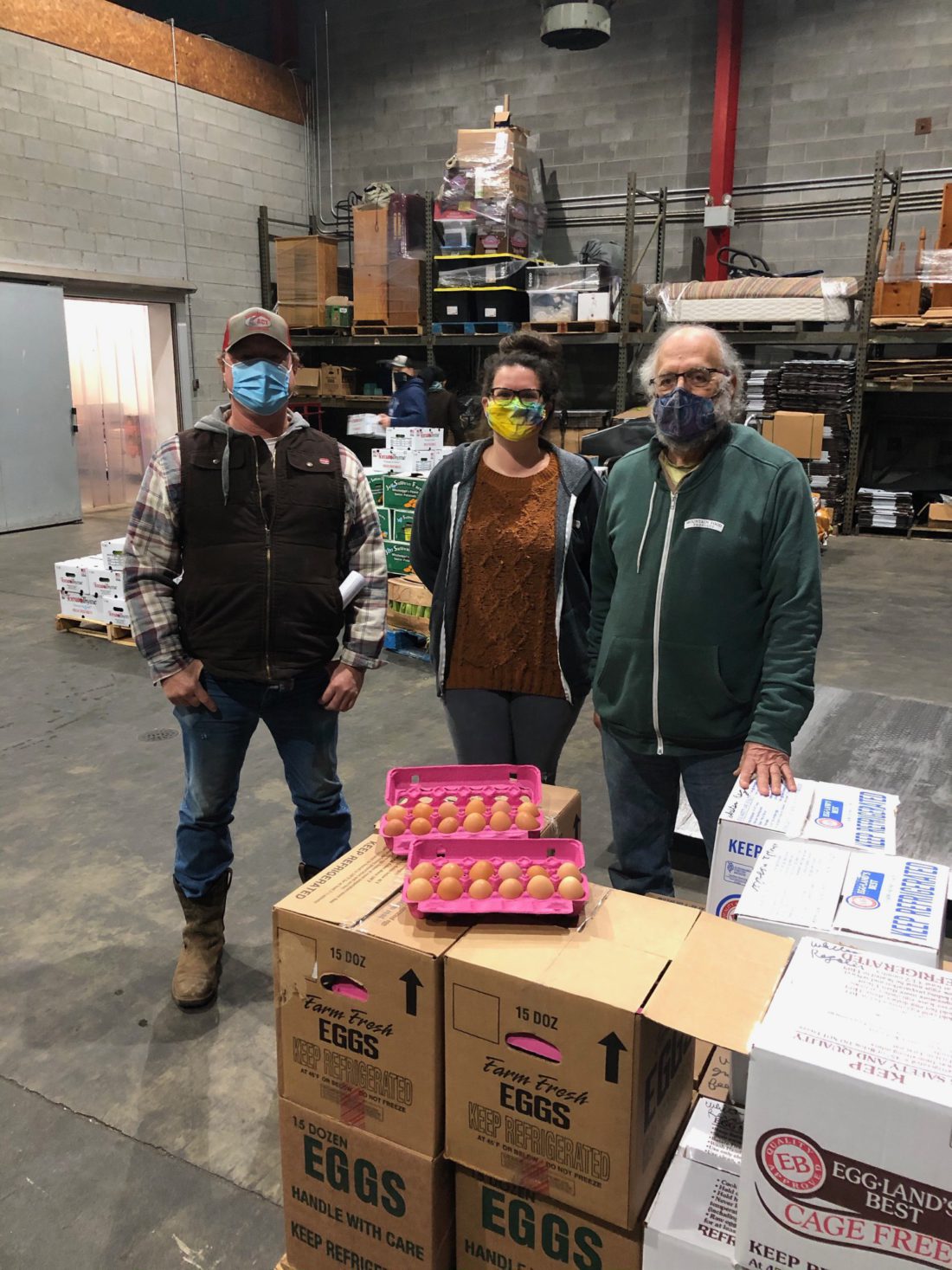At 8 a.m. on the first Saturday of 2021, a rapid and practiced choreography unfurls at Mountain Food Products’ warehouse and loading dock behind the WNC Farmers Market. Meghan Bosley, MFP’s local grower coordinator and wearer of many hats, is juggling phone calls and monitoring orders on a computer screen from a raised desk at the entrance with another worker at her side.
Employees inside the large walk-in coolers load boxes of produce and products onto hand trucks, which other workers wheel out to the loading dock, then, assisted by drivers, pack onto box trucks for delivery to accounts in Buncombe County. Ron Ainspan, a former farmer who started the produce sourcing and distribution business in the early 1980s, performs the role of conductor, pitching in wherever needed.
Like hundreds of other businesses in Western North Carolina, Mountain Food Products has been hanging onto the COVID-19 roller coaster for dear life since the pandemic abruptly changed everything in March. “I saw it coming about a month before, though there was no way to know what exactly was coming,” Ainspan remembers. “We started putting heightened sanitation and safety practices in place and then, like everyone else, we got hit like a brick in mid-March.”
“Everyone else” as it related to his company were the 300-plus restaurants, retail outlets and institutions Mountain Food Products serviced weekly with everything from leeks to lemons, garlic to greens, mushrooms to mangos. Though Ainspan originally launched Mountain Food Products to help develop a market for the produce he grew, he soon heard from restaurants — including his first customer, Mark Rosenstein, founder of The Market Place restaurant — that there was a need for a local distribution system and a source for specialty produce not grown in the area.
Over the years, as Asheville’s restaurant scene flourished, so did Mountain Food Products, which on any given day lists as many as 400 products on its price sheet. Some of those items are locally grown — defined by MFP as within 100 miles of Asheville — and some are organic, but restaurants also need produce from outside the area, such as avocados, cranberries, citrus and bananas, and those items arrive weekly via tractor-trailer.
In mid-March, with restaurants closed to indoor dining and scrambling to figure out their own new ways of operating, Mountain Food Products’ accounts stopped ordering. “It basically killed 80%-90% of our business, and I had to lay off our entire staff — about 30 people,” says Ainspan. Some of his employees, though, refused to be laid off and continued coming in to do whatever they could, he notes with a laugh.
Among the alternative models he explored and put into place were a home delivery service his daughter created called The Mobile Vegetable, an open-air market at their loading dock and in front of Vinnie’s Neighborhood Italian restaurant on Merrimon Avenue, adding more clients to MFP’s existing community-supported agriculture program, increasing deliveries to businesses like Mother Earth Food and creating new relationships with groups distributing food boxes to the community, such as the YMCA and Bounty & Soul.
About a month into the crisis, Ainspan realized that if he could get MFP back to doing 40% of its pre-pandemic business, the company would be sustainable. He gives kudos to the state for helping him achieve that mark by maintaining reasonable lease rates.
“That, coupled with having the flexibility to shrink labor by as much as we had to shrink sales volume, made us workable to where we could cover our rent and utilities and things like that at 40%,” he explains. “I don’t think that would be sustainable for the long run, but in the short run, to get us through the worst of it, we can do it.”
By the arrival of the fall tourist season, the business had managed to achieve about 85% of its pre-pandemic capacity. But now, with winter settled in and restaurants struggling to remain in business with little outdoor dining and further reduced indoor capacity, Mountain Food Products has seen its business dip again, dropping to 65%-70% of what is normal for this time of year.
Although sales are down, the company is still operating within its sustainability target, but unpredictability has proved to be another challenge, Ainspan says. For example, he had not expected to be as busy as he was on Jan. 2, with his team hustling to fill orders while short staffed.
But he continues to be hopeful about the future. “The new stimulus they finally signed will help provide a bridge,” he says. “By spring, weather will improve, and people can sit outside again. The vaccine is rolling out. … We’ve gotten to January, and we’re still here. Ninety days from now I think the world will look a lot different.”




Before you comment
The comments section is here to provide a platform for civil dialogue on the issues we face together as a local community. Xpress is committed to offering this platform for all voices, but when the tone of the discussion gets nasty or strays off topic, we believe many people choose not to participate. Xpress editors are determined to moderate comments to ensure a constructive interchange is maintained. All comments judged not to be in keeping with the spirit of civil discourse will be removed and repeat violators will be banned. See here for our terms of service. Thank you for being part of this effort to promote respectful discussion.